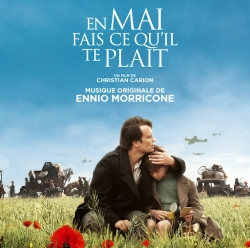Original Review by Jonathan Broxton
If the information on the Internet Movie Database is correct, En Mai Fais Ce Qu’il te Plaît is the 521st score of Ennio Morricone’s career, which stretches back to his first score, Il Federale, in 1961. In the intervening 54 years the Italian has written some of the most iconic music in the history of cinema; En Mai Fais Ce Qu’il te Plaît will likely not be remembered as one of his standout works but, considering the fact that he is now aged 86, that he is writing film music at all is a minor miracle. That it’s still this good is nothing short of astonishing. The film – the title of which translates to Darling Buds of May in English – is a French drama written and directed by Christian Carion, who previously directed the well regarded films Une Hirondelle a Fait le Printemps and Joyeux Noël. Set during the early days of World War II, the story follows a group of people from a small village in Pas-de-Calais in northern France, who flee from the advancing German troops, and essentially become homeless, traversing the French countryside trying to avoid the Nazis, while trying to retain some semblance of a normal life under new, terrible circumstances.
The score is quintessential Ennio Morricone. Conducted and orchestrated by the great man himself, it contains a pair of utterly magnificent central themes, sweet and romantic but also deeply melancholic, which are offset by some more dramatic suspense music accompanying the threat of war that displaces the families from their village. After a several minutes of minimalist buildup for strings and organ, the opening cue, “En Mai,” gradually emerges from its repetitive four-note base into a simply stunning main theme, redolent of summer time, rolling countryside, and a tranquil environment.
Morricone embraces this style of writing in several subsequent cues. “Ils Resteront Trois” introduces the secondary theme, for the lead character, Paul, and his wife and son. It’s one of those heart-meltingly gorgeous melodies that only Morricone can write, and has a hint of Cinema Paradiso to it, especially in the string harmonies, but the return of the subtle organ orchestration from the opening cue gives it a slightly religioso quality too, that is both appropriate and appealing. Later, “Tout Laisser” embraces some hints of traditional Gallic folk music, stripped down to just an accordion, harmonica, and solo violin, and has a bittersweet sense of loss and regret, before returning to restate the Family theme, again with a wash of melancholy strings. The subsequent “Respirations” is filled with a sense of relief, of families being reunited, and the simple pleasure of being with the ones you love.
Meanwhile, “L’Étau se Resserre” and “Traverser la Guerre” are filled with tension and apprehension, with tremolo string writing and plucked bass notes that gradually give way to more strident phrases for violins and moody, slightly mysterious-sounding oboes. Similarly, “Ils Arrivent” has a martial cadence and a sense of quiet, stark desperation, with high, pulsating strings and staccato muted brass writing that briefly recalls the similar-sounding militaristic tones of his score for Indagine su un Cittadino al di Sopra di Ogni Sospetto from 1970. These cues are clearly intended to musically depict the looming threat of the Germans, storming over the border and leaving destruction in their wake; although none of these cues are truly devastating in their depiction of war, they impart instead a sense of resignation and sadness, with the citizens of Pas-de-Calais having lost their homes, their livelihoods, and their peace of mind.
The elegant flute writing of “Tous Ensemble” has an unexpected playfulness to it, again conveying a light and summery air, completely at odds with the tone of the rest of the film. The final two cues, “Et Même les Animaux Sont Avec Eux” and “A la Recherche de la Paix”, are deeply moving, allowing the performance of the Roma Sinfionetta to rise to the fore with statements of both main themes. The emotional quality of the music really shines through in the first cue, recalling works like Casualties of War and A Time of Destiny, eulogizing the losses that war brings to everyone, while celebrating the stoicism and optimism that humanity can, somehow, maintain in the most desperate conditions. However, Morricone saves the best for last; the stirring solo trumpet performance that anchors the first half of the final cue is especially lovely, having a wistful and nostalgic quality, and an air of remembrance that is wholly appropriate. When the solo female vocalist enters for the first and only time during the second half of the cue, providing haunting counterpoint to the orchestral performance of the main theme, the effect is sensational. Edda dell’Orso would be proud.
No-one writes film music like Ennio Morricone, and no-one else ever will. He has successfully written music in every conceivable genre, and has been a groundbreaking trailblazer in all of them. However, despite how creative his western and thriller scores are, and despite how much innovation he has brought to the table throughout the decades, it is his drama and romance writing that holds a special place in my heart. Although he clearly has a signature sound, with familiar chord progressions and instrumental combinations that span the decades, his capacity for writing utterly spellbinding, ridiculously beautiful themes is simply unparalleled, and En Mai Fais Ce Qu’il te Plaît is another one that we can add to that canon. Of course, as I said earlier, it will never be mentioned in the same breath as the likes of Cinema Paradiso, Once Upon a Time in America, The Red Tent, or my own personal favorite, La Califfa, but considering his advancing years, anything Ennio Morricone writes these days should be cherished. En Mai Fais Ce Qu’il te Plaît is an essential purchase for fans of the maestro’s work.
Buy the En Mai Fais Ce Qu’il te Plaît soundtrack from the Movie Music UK Store
Track Listing:
- En Mai (8:56)
- L’Étau se Resserre (3:58)
- Ils Resteront Trois (5:05)
- Traverser la Guerre (1:55)
- Tout Laisser (2:51)
- Ils Arrivent (3:39)
- Respirations (4:07)
- Tous Ensemble (2:38)
- Et Même les Animaux Sont Avec Eux (4:37)
- A la Recherche de la Paix (6:29)
Running Time: 44 minutes 16 seconds
Quartet Records (2015)
Music composed and conducted by Ennio Morricone. Performed by the Roma Sinfionetta. Orchestrations by Ennio Morricone. Recorded and mixed by Marco Streccioni. Album produced by Ennio Morricone and Pascal Meyer.












